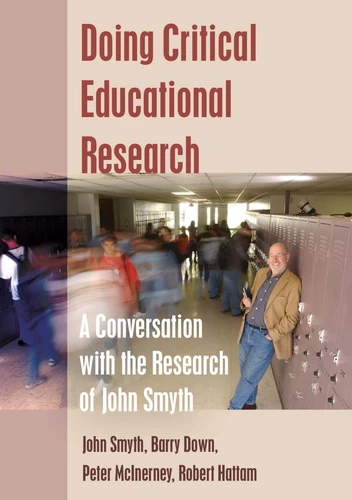Doing Critical Educational Research. A Conversation with the Research of John Smyth
Par : , , ,Formats :
- Paiement en ligne :
- Livraison à domicile ou en point Mondial Relay indisponible
- Retrait Click and Collect en magasin gratuit
- Nombre de pages193
- ISBN978-1-4331-2317-7
- EAN9781433123177
- Date de parution01/08/2014
- CollectionTeaching Contemporary Scholars
- ÉditeurPeter Lang
Résumé
John Smyth's remarkable body of writing, research and scholarship has spanned four decades, and the urgency of our times makes it imperative to look in some depth at the breadth of his research and its trajectory, in order to see how we can connect, extend, build and enrich our understandings from it. Possibly the single most unique aspect to Smyth's version of critical research is his passion for living and ‘doing' what it means to be a critical pedagogue.
For him, ‘doing' is a verb that gives expression to what he believes it means to be a critical scholar. This necessitates actively listening to lives ; taking on an advocacy position with informant groups ; displaying a commitment to praxis ; and being activist in celebrating ‘local responses' to global issues. Smyth's research is pursued with vigour through the lives he researches, as he interrupts and punctures ‘bad' theory, supplanting it with more democratic alternatives, which, by his own admission, makes his research (and all research), political.
For him, ‘doing' is a verb that gives expression to what he believes it means to be a critical scholar. This necessitates actively listening to lives ; taking on an advocacy position with informant groups ; displaying a commitment to praxis ; and being activist in celebrating ‘local responses' to global issues. Smyth's research is pursued with vigour through the lives he researches, as he interrupts and punctures ‘bad' theory, supplanting it with more democratic alternatives, which, by his own admission, makes his research (and all research), political.
John Smyth's remarkable body of writing, research and scholarship has spanned four decades, and the urgency of our times makes it imperative to look in some depth at the breadth of his research and its trajectory, in order to see how we can connect, extend, build and enrich our understandings from it. Possibly the single most unique aspect to Smyth's version of critical research is his passion for living and ‘doing' what it means to be a critical pedagogue.
For him, ‘doing' is a verb that gives expression to what he believes it means to be a critical scholar. This necessitates actively listening to lives ; taking on an advocacy position with informant groups ; displaying a commitment to praxis ; and being activist in celebrating ‘local responses' to global issues. Smyth's research is pursued with vigour through the lives he researches, as he interrupts and punctures ‘bad' theory, supplanting it with more democratic alternatives, which, by his own admission, makes his research (and all research), political.
For him, ‘doing' is a verb that gives expression to what he believes it means to be a critical scholar. This necessitates actively listening to lives ; taking on an advocacy position with informant groups ; displaying a commitment to praxis ; and being activist in celebrating ‘local responses' to global issues. Smyth's research is pursued with vigour through the lives he researches, as he interrupts and punctures ‘bad' theory, supplanting it with more democratic alternatives, which, by his own admission, makes his research (and all research), political.


